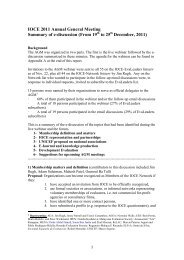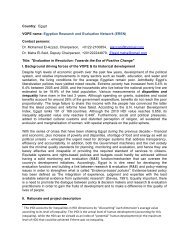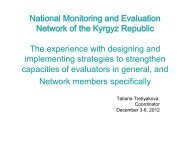The Program Evaluation Standards in International Settings
The Program Evaluation Standards in International Settings - IOCE
The Program Evaluation Standards in International Settings - IOCE
You also want an ePaper? Increase the reach of your titles
YUMPU automatically turns print PDFs into web optimized ePapers that Google loves.
16 Sandy TautU5 Report Clarity <strong>Evaluation</strong> reports should clearly describe the program be<strong>in</strong>gevaluated, <strong>in</strong>clud<strong>in</strong>g its context, and the purposes, procedures, and f<strong>in</strong>d<strong>in</strong>gs of theevaluation, so that essential <strong>in</strong>formation is provided and easily understood.<strong>The</strong> fifth Utility Standard U5, Report Clarity, generally seems culturally universal but theconcept of clarity touches upon a cross-culturally relevant communication style issue. <strong>The</strong>Standard states that “[…] clarity refers to explicit and unencumbered narrative, illustrations, anddescriptions” (Jo<strong>in</strong>t Committee, 1994, p. 49). This might be contra<strong>in</strong>dicated <strong>in</strong> some cultureswhere <strong>in</strong>direct communication is the socially accepted way to exchange ideas and to makestatements. Barnlund (1975) contends that “the greater the cultural homogeneity [collectivism],the greater the mean<strong>in</strong>g conveyed <strong>in</strong> a s<strong>in</strong>gle word, the more that can be implied rather thanstated” (<strong>in</strong>: Berry et al., 1997, Vol. 3, p. 141). Jang (2000, p. 22) notes that <strong>in</strong> South Korea,public argumentation is “actively shunned because engag<strong>in</strong>g <strong>in</strong> it means to stand out, risk publicdisagreement, and lose favor […].” In addition, context <strong>in</strong>formation will have a different impacton the <strong>in</strong>terpretations of given <strong>in</strong>formation. In collectivist cultures, the greater <strong>in</strong>terdependenceorients people toward greater sensitivity to context <strong>in</strong>formation and more mean<strong>in</strong>g is drawn fromit. In contrast, <strong>in</strong>dividualistic cultures, which are regarded as low-context cultures, place a greateremphasis on dispositional attributions (Berry et al., 1997, Vol. 3, chapter 1, p. 26).U6 Report Timel<strong>in</strong>ess and Dissem<strong>in</strong>ation Significant <strong>in</strong>terim f<strong>in</strong>d<strong>in</strong>gs andevaluation reports should be dissem<strong>in</strong>ated to <strong>in</strong>tended users, so that they can be used<strong>in</strong> a timely fashion.Standard U6, Report Timel<strong>in</strong>ess and Dissem<strong>in</strong>ation, calls for report dissem<strong>in</strong>ation to “all<strong>in</strong>tended users” (Jo<strong>in</strong>t Committee, 1994, p. 53). Reach<strong>in</strong>g all stakeholders is not a goal if theclient expects absolute authority over the evaluation and sole reception of evaluation f<strong>in</strong>d<strong>in</strong>gs.Jang (2000, p. 24f) argues that <strong>in</strong> South Korea, the responsibility of the evaluator is limited to“report<strong>in</strong>g to the top client” and that the top client decides about “the extent to which evaluationresults are shared.” Consequently, the practice of “fail<strong>in</strong>g to recognize stakeholders who do nothave spokespersons” (Jo<strong>in</strong>t Committee, 1994, p. 55, labeled as a Common Error) might beacceptable conduct <strong>in</strong> nonegalitarian cultures. Another culturally vary<strong>in</strong>g concept is that oftimel<strong>in</strong>ess. It is not a universal value and might therefore be excluded as part of proper conductfor evaluators <strong>in</strong> certa<strong>in</strong> cultures. For example, “Africans have different concept of time thanWestern audiences” (Russon & Patel, 1999, p. 6; also see Jang, 2000, p. 25; Smith et al., 1994, p.11).






